Leadership and Management Report: Hospitality Sector Analysis
VerifiedAdded on 2020/10/23
|10
|2831
|114
Report
AI Summary
This report provides a detailed analysis of leadership and management principles within the service industry, specifically focusing on the restaurant chain Hazev, Haz and Tas. It begins by exploring the application of classical management theories, such as those of Taylor and Weber, and how they are implemented in the context of digital technology adoption. The report then delves into various leadership styles, including authoritarian and participative approaches, examining their impact on employee engagement and organizational outcomes. Furthermore, it investigates the internal and external factors that influence management styles and organizational structures, such as the impact of owners, employees, technology, and political regulations. The report also differentiates between soft and hard skills in management and leadership, providing practical examples. Finally, it discusses the future management and leadership skills required in the hospitality sector, such as teamwork and delegation of authority, and compares and contrasts management approaches in different organizations.
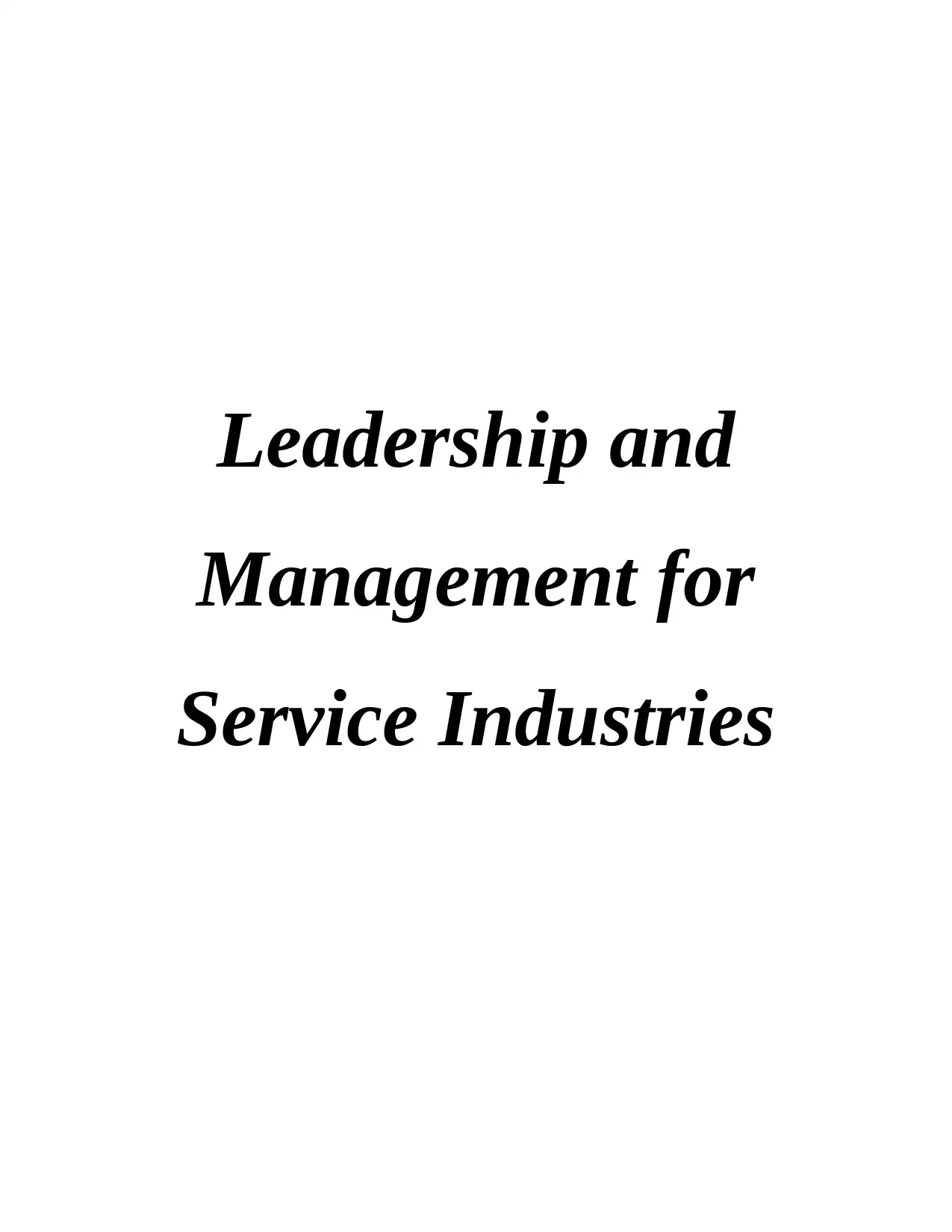
Leadership and
Management for
Service Industries
Management for
Service Industries
Paraphrase This Document
Need a fresh take? Get an instant paraphrase of this document with our AI Paraphraser
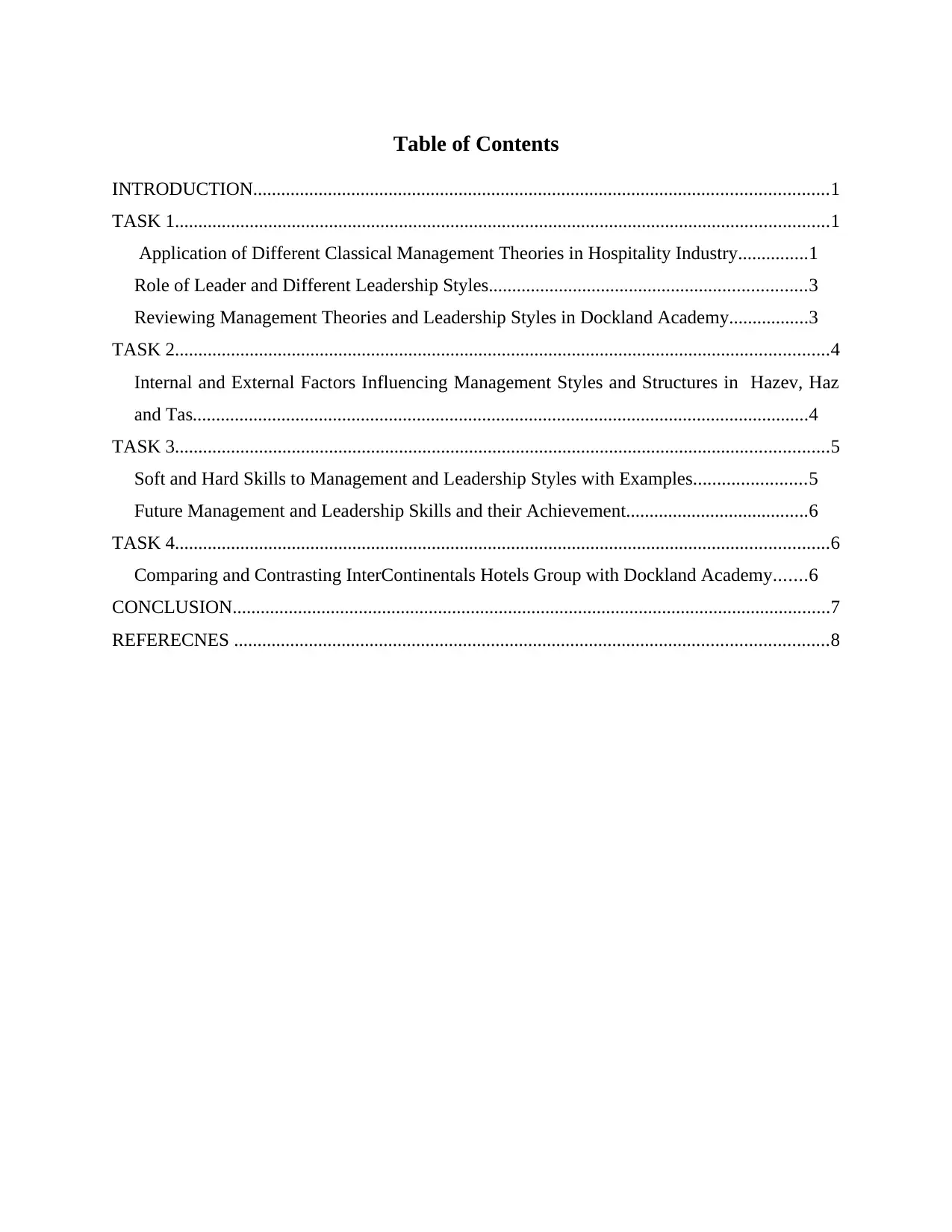
Table of Contents
INTRODUCTION...........................................................................................................................1
TASK 1............................................................................................................................................1
Application of Different Classical Management Theories in Hospitality Industry...............1
Role of Leader and Different Leadership Styles....................................................................3
Reviewing Management Theories and Leadership Styles in Dockland Academy.................3
TASK 2............................................................................................................................................4
Internal and External Factors Influencing Management Styles and Structures in Hazev, Haz
and Tas....................................................................................................................................4
TASK 3............................................................................................................................................5
Soft and Hard Skills to Management and Leadership Styles with Examples........................5
Future Management and Leadership Skills and their Achievement.......................................6
TASK 4............................................................................................................................................6
Comparing and Contrasting InterContinentals Hotels Group with Dockland Academy.......6
CONCLUSION................................................................................................................................7
REFERECNES ...............................................................................................................................8
INTRODUCTION...........................................................................................................................1
TASK 1............................................................................................................................................1
Application of Different Classical Management Theories in Hospitality Industry...............1
Role of Leader and Different Leadership Styles....................................................................3
Reviewing Management Theories and Leadership Styles in Dockland Academy.................3
TASK 2............................................................................................................................................4
Internal and External Factors Influencing Management Styles and Structures in Hazev, Haz
and Tas....................................................................................................................................4
TASK 3............................................................................................................................................5
Soft and Hard Skills to Management and Leadership Styles with Examples........................5
Future Management and Leadership Skills and their Achievement.......................................6
TASK 4............................................................................................................................................6
Comparing and Contrasting InterContinentals Hotels Group with Dockland Academy.......6
CONCLUSION................................................................................................................................7
REFERECNES ...............................................................................................................................8
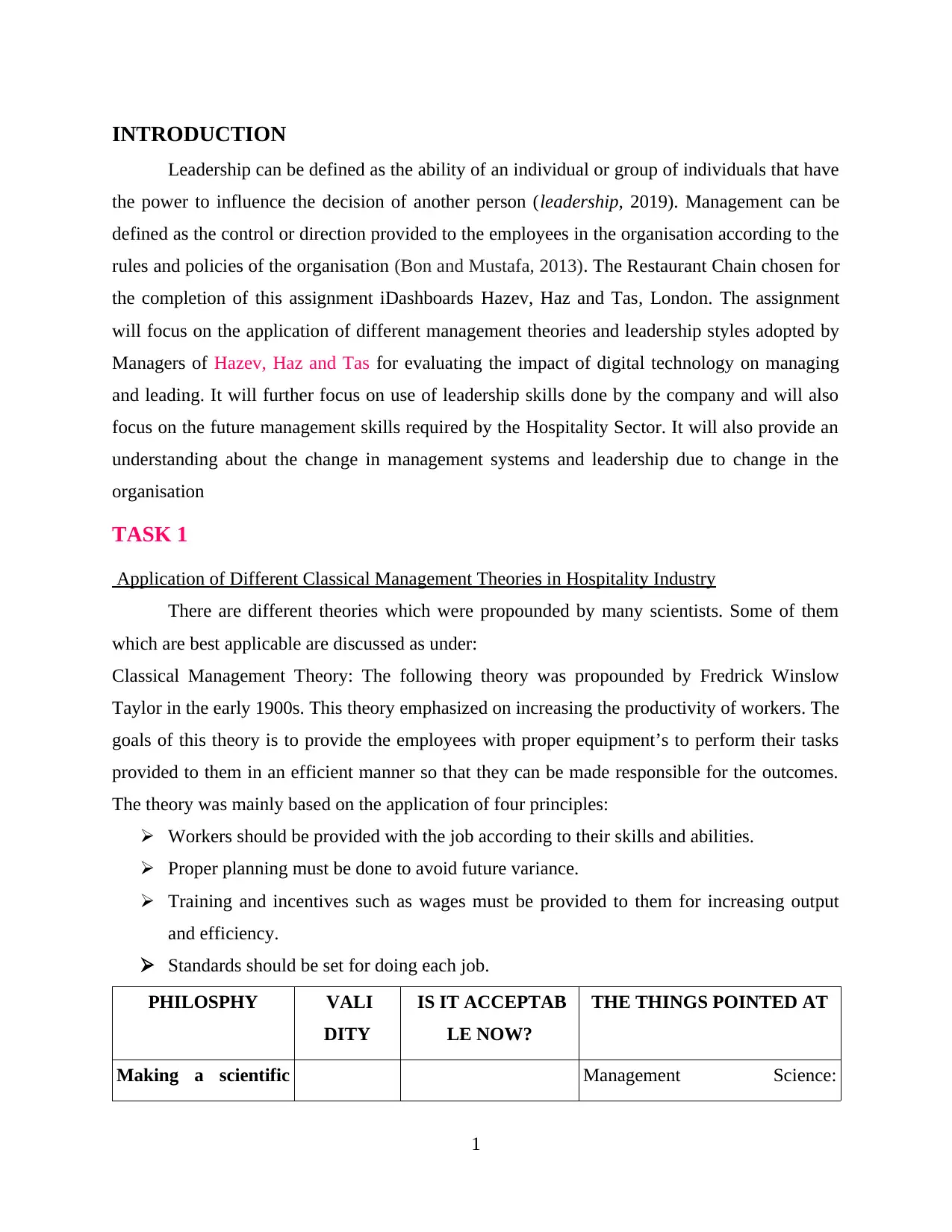
INTRODUCTION
Leadership can be defined as the ability of an individual or group of individuals that have
the power to influence the decision of another person (leadership, 2019). Management can be
defined as the control or direction provided to the employees in the organisation according to the
rules and policies of the organisation (Bon and Mustafa, 2013). The Restaurant Chain chosen for
the completion of this assignment iDashboards Hazev, Haz and Tas, London. The assignment
will focus on the application of different management theories and leadership styles adopted by
Managers of Hazev, Haz and Tas for evaluating the impact of digital technology on managing
and leading. It will further focus on use of leadership skills done by the company and will also
focus on the future management skills required by the Hospitality Sector. It will also provide an
understanding about the change in management systems and leadership due to change in the
organisation
TASK 1
Application of Different Classical Management Theories in Hospitality Industry
There are different theories which were propounded by many scientists. Some of them
which are best applicable are discussed as under:
Classical Management Theory: The following theory was propounded by Fredrick Winslow
Taylor in the early 1900s. This theory emphasized on increasing the productivity of workers. The
goals of this theory is to provide the employees with proper equipment’s to perform their tasks
provided to them in an efficient manner so that they can be made responsible for the outcomes.
The theory was mainly based on the application of four principles:
Workers should be provided with the job according to their skills and abilities.
Proper planning must be done to avoid future variance.
Training and incentives such as wages must be provided to them for increasing output
and efficiency.
Standards should be set for doing each job.
PHILOSPHY VALI
DITY
IS IT ACCEPTAB
LE NOW?
THE THINGS POINTED AT
Making a scientific Management Science:
1
Leadership can be defined as the ability of an individual or group of individuals that have
the power to influence the decision of another person (leadership, 2019). Management can be
defined as the control or direction provided to the employees in the organisation according to the
rules and policies of the organisation (Bon and Mustafa, 2013). The Restaurant Chain chosen for
the completion of this assignment iDashboards Hazev, Haz and Tas, London. The assignment
will focus on the application of different management theories and leadership styles adopted by
Managers of Hazev, Haz and Tas for evaluating the impact of digital technology on managing
and leading. It will further focus on use of leadership skills done by the company and will also
focus on the future management skills required by the Hospitality Sector. It will also provide an
understanding about the change in management systems and leadership due to change in the
organisation
TASK 1
Application of Different Classical Management Theories in Hospitality Industry
There are different theories which were propounded by many scientists. Some of them
which are best applicable are discussed as under:
Classical Management Theory: The following theory was propounded by Fredrick Winslow
Taylor in the early 1900s. This theory emphasized on increasing the productivity of workers. The
goals of this theory is to provide the employees with proper equipment’s to perform their tasks
provided to them in an efficient manner so that they can be made responsible for the outcomes.
The theory was mainly based on the application of four principles:
Workers should be provided with the job according to their skills and abilities.
Proper planning must be done to avoid future variance.
Training and incentives such as wages must be provided to them for increasing output
and efficiency.
Standards should be set for doing each job.
PHILOSPHY VALI
DITY
IS IT ACCEPTAB
LE NOW?
THE THINGS POINTED AT
Making a scientific Management Science:
1
⊘ This is a preview!⊘
Do you want full access?
Subscribe today to unlock all pages.

Trusted by 1+ million students worldwide
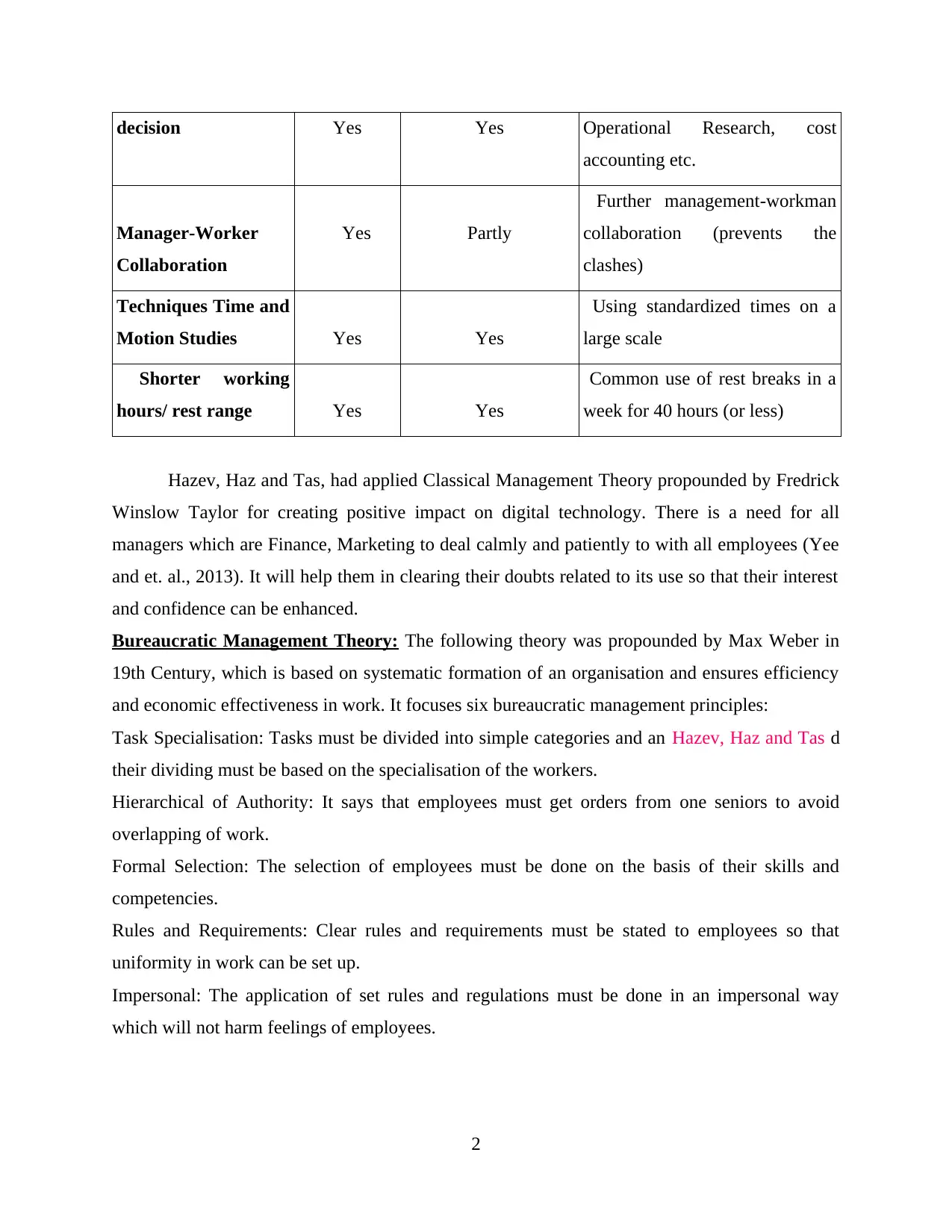
decision Yes Yes Operational Research, cost
accounting etc.
Manager-Worker
Collaboration
Yes Partly
Further management-workman
collaboration (prevents the
clashes)
Techniques Time and
Motion Studies Yes Yes
Using standardized times on a
large scale
Shorter working
hours/ rest range Yes Yes
Common use of rest breaks in a
week for 40 hours (or less)
Hazev, Haz and Tas, had applied Classical Management Theory propounded by Fredrick
Winslow Taylor for creating positive impact on digital technology. There is a need for all
managers which are Finance, Marketing to deal calmly and patiently to with all employees (Yee
and et. al., 2013). It will help them in clearing their doubts related to its use so that their interest
and confidence can be enhanced.
Bureaucratic Management Theory: The following theory was propounded by Max Weber in
19th Century, which is based on systematic formation of an organisation and ensures efficiency
and economic effectiveness in work. It focuses six bureaucratic management principles:
Task Specialisation: Tasks must be divided into simple categories and an Hazev, Haz and Tas d
their dividing must be based on the specialisation of the workers.
Hierarchical of Authority: It says that employees must get orders from one seniors to avoid
overlapping of work.
Formal Selection: The selection of employees must be done on the basis of their skills and
competencies.
Rules and Requirements: Clear rules and requirements must be stated to employees so that
uniformity in work can be set up.
Impersonal: The application of set rules and regulations must be done in an impersonal way
which will not harm feelings of employees.
2
accounting etc.
Manager-Worker
Collaboration
Yes Partly
Further management-workman
collaboration (prevents the
clashes)
Techniques Time and
Motion Studies Yes Yes
Using standardized times on a
large scale
Shorter working
hours/ rest range Yes Yes
Common use of rest breaks in a
week for 40 hours (or less)
Hazev, Haz and Tas, had applied Classical Management Theory propounded by Fredrick
Winslow Taylor for creating positive impact on digital technology. There is a need for all
managers which are Finance, Marketing to deal calmly and patiently to with all employees (Yee
and et. al., 2013). It will help them in clearing their doubts related to its use so that their interest
and confidence can be enhanced.
Bureaucratic Management Theory: The following theory was propounded by Max Weber in
19th Century, which is based on systematic formation of an organisation and ensures efficiency
and economic effectiveness in work. It focuses six bureaucratic management principles:
Task Specialisation: Tasks must be divided into simple categories and an Hazev, Haz and Tas d
their dividing must be based on the specialisation of the workers.
Hierarchical of Authority: It says that employees must get orders from one seniors to avoid
overlapping of work.
Formal Selection: The selection of employees must be done on the basis of their skills and
competencies.
Rules and Requirements: Clear rules and requirements must be stated to employees so that
uniformity in work can be set up.
Impersonal: The application of set rules and regulations must be done in an impersonal way
which will not harm feelings of employees.
2
Paraphrase This Document
Need a fresh take? Get an instant paraphrase of this document with our AI Paraphraser
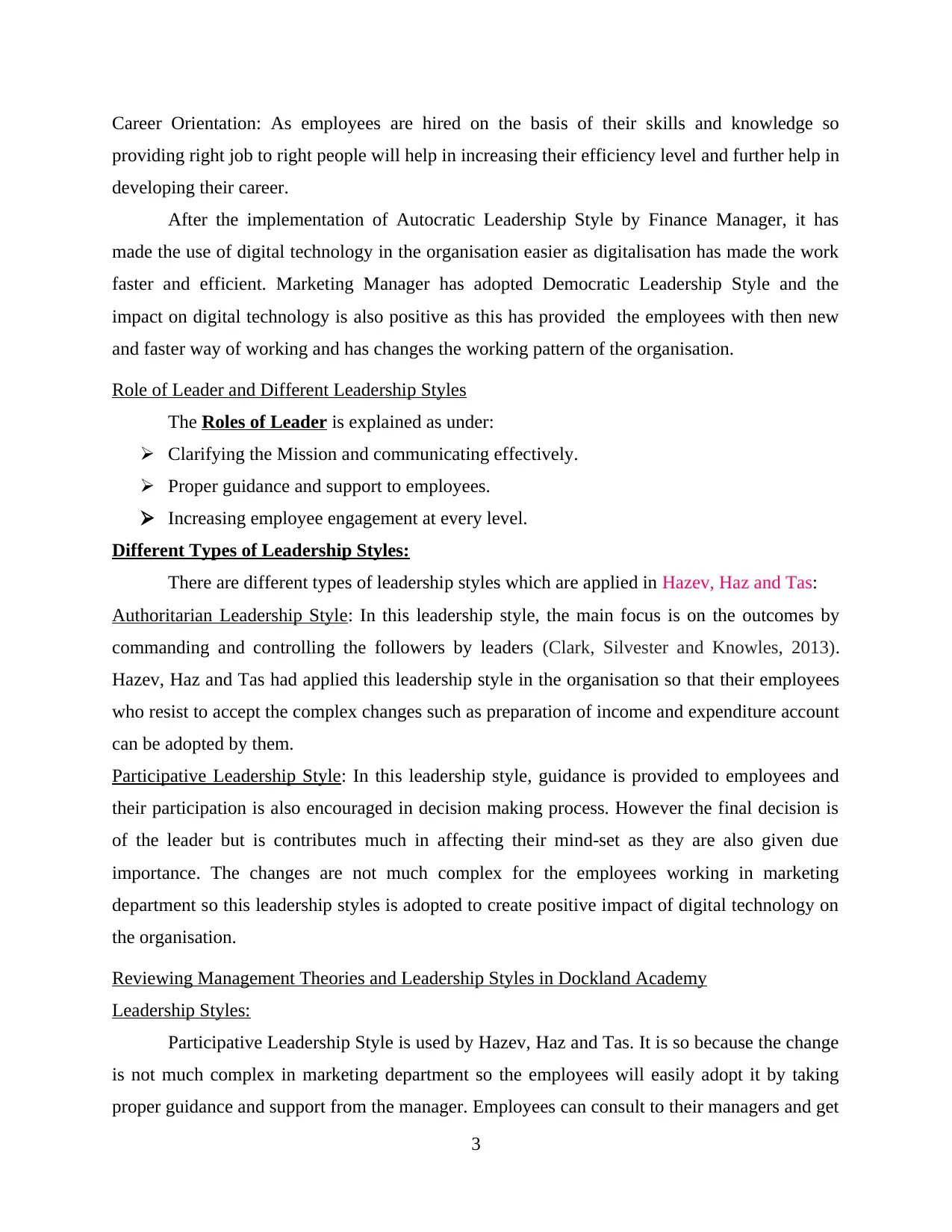
Career Orientation: As employees are hired on the basis of their skills and knowledge so
providing right job to right people will help in increasing their efficiency level and further help in
developing their career.
After the implementation of Autocratic Leadership Style by Finance Manager, it has
made the use of digital technology in the organisation easier as digitalisation has made the work
faster and efficient. Marketing Manager has adopted Democratic Leadership Style and the
impact on digital technology is also positive as this has provided the employees with then new
and faster way of working and has changes the working pattern of the organisation.
Role of Leader and Different Leadership Styles
The Roles of Leader is explained as under:
Clarifying the Mission and communicating effectively.
Proper guidance and support to employees.
Increasing employee engagement at every level.
Different Types of Leadership Styles:
There are different types of leadership styles which are applied in Hazev, Haz and Tas:
Authoritarian Leadership Style: In this leadership style, the main focus is on the outcomes by
commanding and controlling the followers by leaders (Clark, Silvester and Knowles, 2013).
Hazev, Haz and Tas had applied this leadership style in the organisation so that their employees
who resist to accept the complex changes such as preparation of income and expenditure account
can be adopted by them.
Participative Leadership Style: In this leadership style, guidance is provided to employees and
their participation is also encouraged in decision making process. However the final decision is
of the leader but is contributes much in affecting their mind-set as they are also given due
importance. The changes are not much complex for the employees working in marketing
department so this leadership styles is adopted to create positive impact of digital technology on
the organisation.
Reviewing Management Theories and Leadership Styles in Dockland Academy
Leadership Styles:
Participative Leadership Style is used by Hazev, Haz and Tas. It is so because the change
is not much complex in marketing department so the employees will easily adopt it by taking
proper guidance and support from the manager. Employees can consult to their managers and get
3
providing right job to right people will help in increasing their efficiency level and further help in
developing their career.
After the implementation of Autocratic Leadership Style by Finance Manager, it has
made the use of digital technology in the organisation easier as digitalisation has made the work
faster and efficient. Marketing Manager has adopted Democratic Leadership Style and the
impact on digital technology is also positive as this has provided the employees with then new
and faster way of working and has changes the working pattern of the organisation.
Role of Leader and Different Leadership Styles
The Roles of Leader is explained as under:
Clarifying the Mission and communicating effectively.
Proper guidance and support to employees.
Increasing employee engagement at every level.
Different Types of Leadership Styles:
There are different types of leadership styles which are applied in Hazev, Haz and Tas:
Authoritarian Leadership Style: In this leadership style, the main focus is on the outcomes by
commanding and controlling the followers by leaders (Clark, Silvester and Knowles, 2013).
Hazev, Haz and Tas had applied this leadership style in the organisation so that their employees
who resist to accept the complex changes such as preparation of income and expenditure account
can be adopted by them.
Participative Leadership Style: In this leadership style, guidance is provided to employees and
their participation is also encouraged in decision making process. However the final decision is
of the leader but is contributes much in affecting their mind-set as they are also given due
importance. The changes are not much complex for the employees working in marketing
department so this leadership styles is adopted to create positive impact of digital technology on
the organisation.
Reviewing Management Theories and Leadership Styles in Dockland Academy
Leadership Styles:
Participative Leadership Style is used by Hazev, Haz and Tas. It is so because the change
is not much complex in marketing department so the employees will easily adopt it by taking
proper guidance and support from the manager. Employees can consult to their managers and get
3
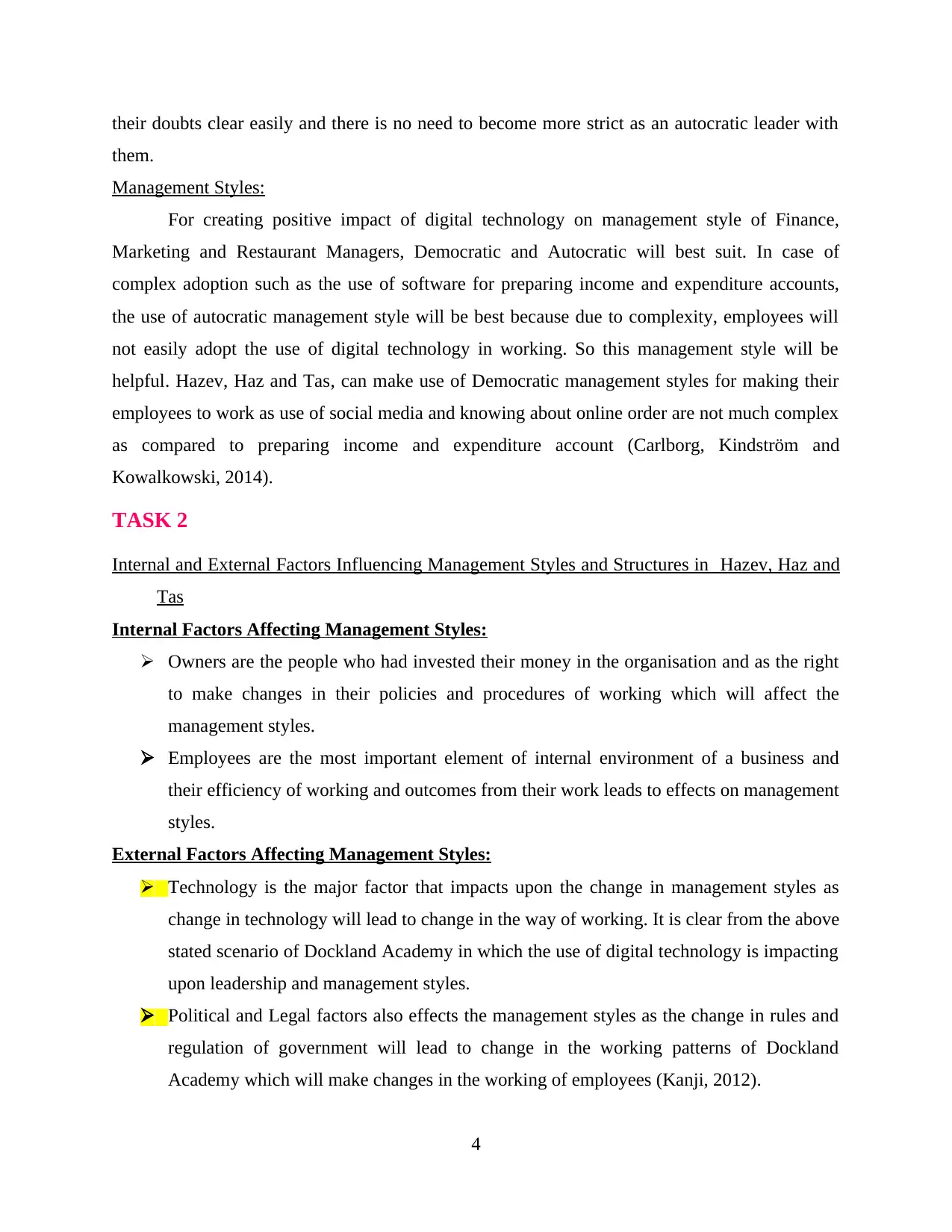
their doubts clear easily and there is no need to become more strict as an autocratic leader with
them.
Management Styles:
For creating positive impact of digital technology on management style of Finance,
Marketing and Restaurant Managers, Democratic and Autocratic will best suit. In case of
complex adoption such as the use of software for preparing income and expenditure accounts,
the use of autocratic management style will be best because due to complexity, employees will
not easily adopt the use of digital technology in working. So this management style will be
helpful. Hazev, Haz and Tas, can make use of Democratic management styles for making their
employees to work as use of social media and knowing about online order are not much complex
as compared to preparing income and expenditure account (Carlborg, Kindström and
Kowalkowski, 2014).
TASK 2
Internal and External Factors Influencing Management Styles and Structures in Hazev, Haz and
Tas
Internal Factors Affecting Management Styles:
Owners are the people who had invested their money in the organisation and as the right
to make changes in their policies and procedures of working which will affect the
management styles.
Employees are the most important element of internal environment of a business and
their efficiency of working and outcomes from their work leads to effects on management
styles.
External Factors Affecting Management Styles:
Technology is the major factor that impacts upon the change in management styles as
change in technology will lead to change in the way of working. It is clear from the above
stated scenario of Dockland Academy in which the use of digital technology is impacting
upon leadership and management styles.
Political and Legal factors also effects the management styles as the change in rules and
regulation of government will lead to change in the working patterns of Dockland
Academy which will make changes in the working of employees (Kanji, 2012).
4
them.
Management Styles:
For creating positive impact of digital technology on management style of Finance,
Marketing and Restaurant Managers, Democratic and Autocratic will best suit. In case of
complex adoption such as the use of software for preparing income and expenditure accounts,
the use of autocratic management style will be best because due to complexity, employees will
not easily adopt the use of digital technology in working. So this management style will be
helpful. Hazev, Haz and Tas, can make use of Democratic management styles for making their
employees to work as use of social media and knowing about online order are not much complex
as compared to preparing income and expenditure account (Carlborg, Kindström and
Kowalkowski, 2014).
TASK 2
Internal and External Factors Influencing Management Styles and Structures in Hazev, Haz and
Tas
Internal Factors Affecting Management Styles:
Owners are the people who had invested their money in the organisation and as the right
to make changes in their policies and procedures of working which will affect the
management styles.
Employees are the most important element of internal environment of a business and
their efficiency of working and outcomes from their work leads to effects on management
styles.
External Factors Affecting Management Styles:
Technology is the major factor that impacts upon the change in management styles as
change in technology will lead to change in the way of working. It is clear from the above
stated scenario of Dockland Academy in which the use of digital technology is impacting
upon leadership and management styles.
Political and Legal factors also effects the management styles as the change in rules and
regulation of government will lead to change in the working patterns of Dockland
Academy which will make changes in the working of employees (Kanji, 2012).
4
⊘ This is a preview!⊘
Do you want full access?
Subscribe today to unlock all pages.

Trusted by 1+ million students worldwide
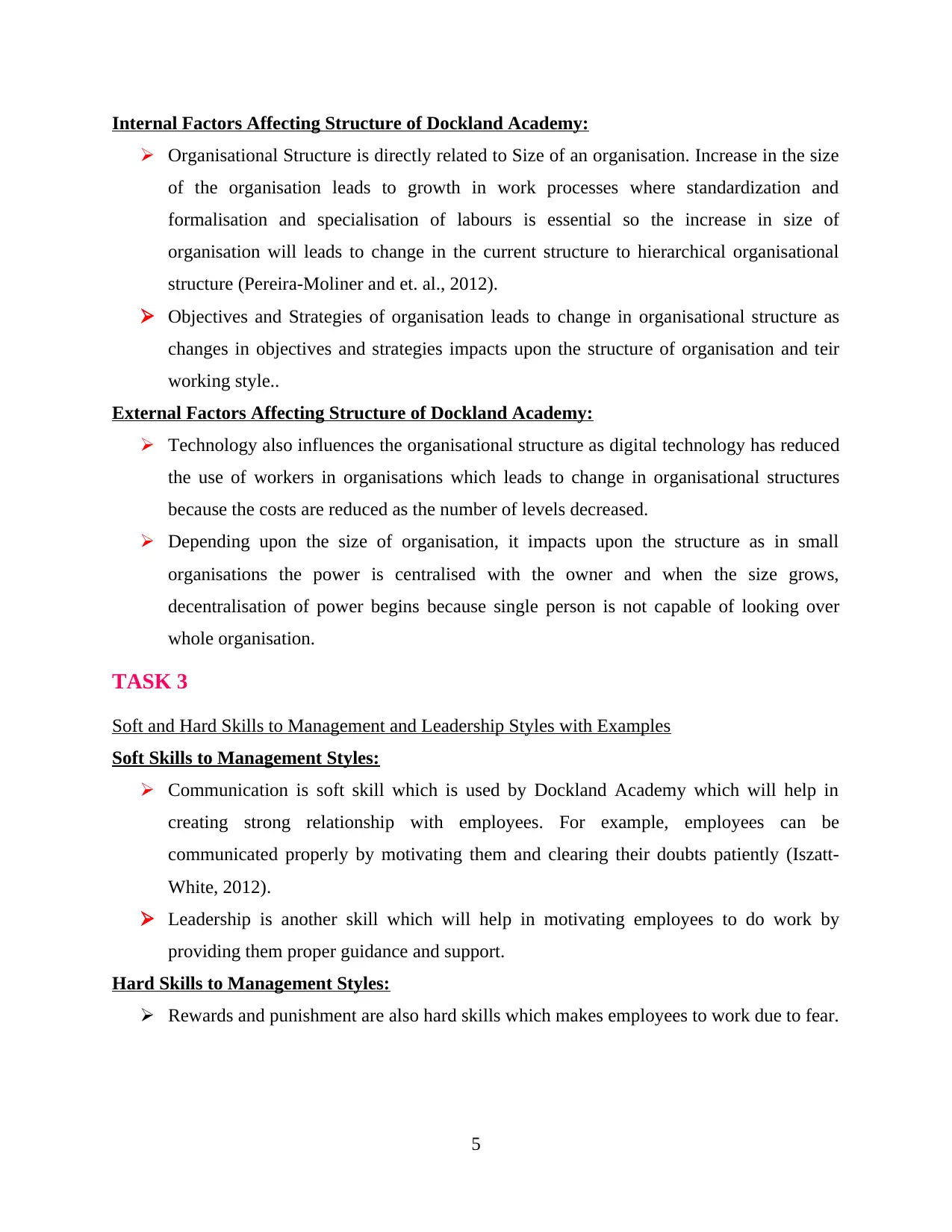
Internal Factors Affecting Structure of Dockland Academy:
Organisational Structure is directly related to Size of an organisation. Increase in the size
of the organisation leads to growth in work processes where standardization and
formalisation and specialisation of labours is essential so the increase in size of
organisation will leads to change in the current structure to hierarchical organisational
structure (Pereira-Moliner and et. al., 2012).
Objectives and Strategies of organisation leads to change in organisational structure as
changes in objectives and strategies impacts upon the structure of organisation and teir
working style..
External Factors Affecting Structure of Dockland Academy:
Technology also influences the organisational structure as digital technology has reduced
the use of workers in organisations which leads to change in organisational structures
because the costs are reduced as the number of levels decreased.
Depending upon the size of organisation, it impacts upon the structure as in small
organisations the power is centralised with the owner and when the size grows,
decentralisation of power begins because single person is not capable of looking over
whole organisation.
TASK 3
Soft and Hard Skills to Management and Leadership Styles with Examples
Soft Skills to Management Styles:
Communication is soft skill which is used by Dockland Academy which will help in
creating strong relationship with employees. For example, employees can be
communicated properly by motivating them and clearing their doubts patiently (Iszatt-
White, 2012).
Leadership is another skill which will help in motivating employees to do work by
providing them proper guidance and support.
Hard Skills to Management Styles:
Rewards and punishment are also hard skills which makes employees to work due to fear.
5
Organisational Structure is directly related to Size of an organisation. Increase in the size
of the organisation leads to growth in work processes where standardization and
formalisation and specialisation of labours is essential so the increase in size of
organisation will leads to change in the current structure to hierarchical organisational
structure (Pereira-Moliner and et. al., 2012).
Objectives and Strategies of organisation leads to change in organisational structure as
changes in objectives and strategies impacts upon the structure of organisation and teir
working style..
External Factors Affecting Structure of Dockland Academy:
Technology also influences the organisational structure as digital technology has reduced
the use of workers in organisations which leads to change in organisational structures
because the costs are reduced as the number of levels decreased.
Depending upon the size of organisation, it impacts upon the structure as in small
organisations the power is centralised with the owner and when the size grows,
decentralisation of power begins because single person is not capable of looking over
whole organisation.
TASK 3
Soft and Hard Skills to Management and Leadership Styles with Examples
Soft Skills to Management Styles:
Communication is soft skill which is used by Dockland Academy which will help in
creating strong relationship with employees. For example, employees can be
communicated properly by motivating them and clearing their doubts patiently (Iszatt-
White, 2012).
Leadership is another skill which will help in motivating employees to do work by
providing them proper guidance and support.
Hard Skills to Management Styles:
Rewards and punishment are also hard skills which makes employees to work due to fear.
5
Paraphrase This Document
Need a fresh take? Get an instant paraphrase of this document with our AI Paraphraser
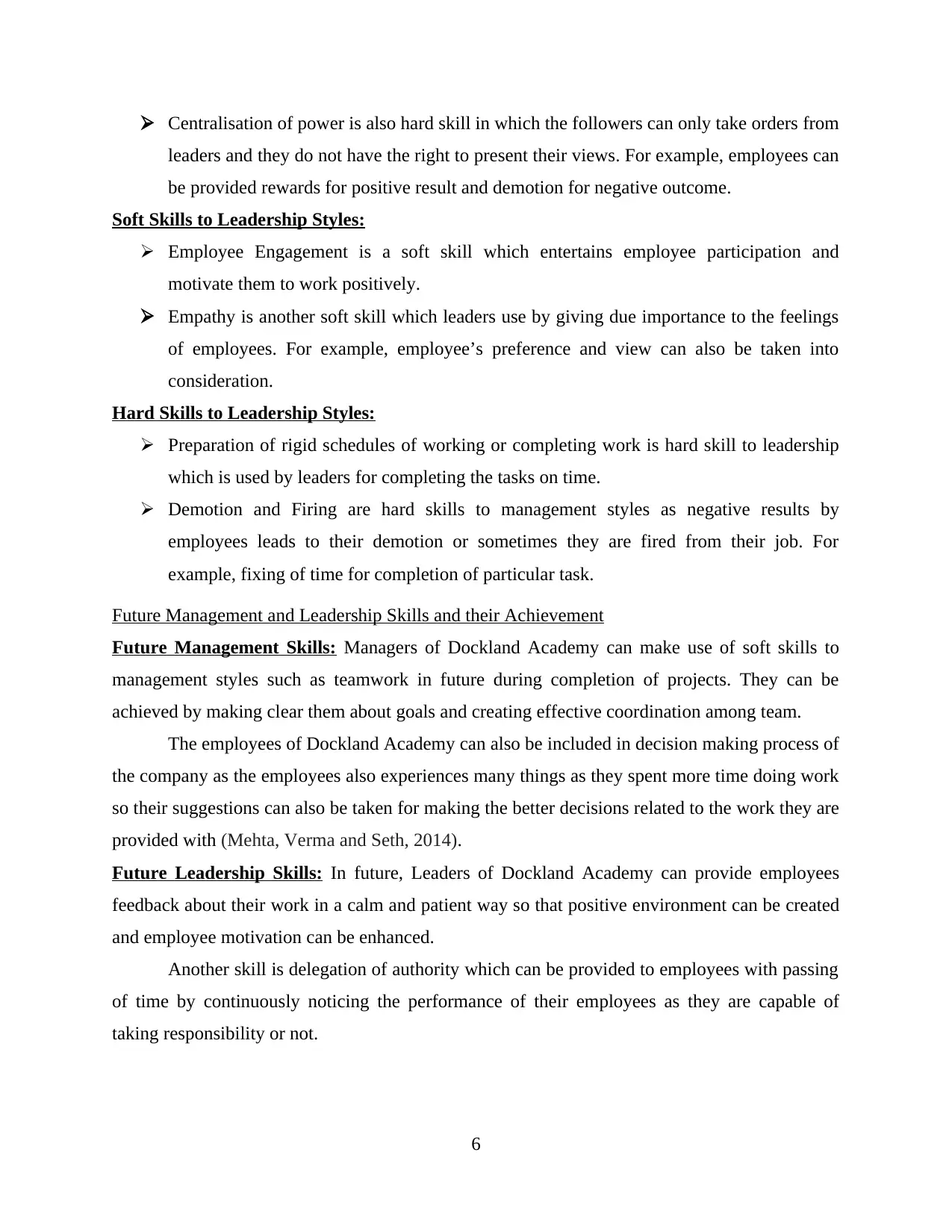
Centralisation of power is also hard skill in which the followers can only take orders from
leaders and they do not have the right to present their views. For example, employees can
be provided rewards for positive result and demotion for negative outcome.
Soft Skills to Leadership Styles:
Employee Engagement is a soft skill which entertains employee participation and
motivate them to work positively.
Empathy is another soft skill which leaders use by giving due importance to the feelings
of employees. For example, employee’s preference and view can also be taken into
consideration.
Hard Skills to Leadership Styles:
Preparation of rigid schedules of working or completing work is hard skill to leadership
which is used by leaders for completing the tasks on time.
Demotion and Firing are hard skills to management styles as negative results by
employees leads to their demotion or sometimes they are fired from their job. For
example, fixing of time for completion of particular task.
Future Management and Leadership Skills and their Achievement
Future Management Skills: Managers of Dockland Academy can make use of soft skills to
management styles such as teamwork in future during completion of projects. They can be
achieved by making clear them about goals and creating effective coordination among team.
The employees of Dockland Academy can also be included in decision making process of
the company as the employees also experiences many things as they spent more time doing work
so their suggestions can also be taken for making the better decisions related to the work they are
provided with (Mehta, Verma and Seth, 2014).
Future Leadership Skills: In future, Leaders of Dockland Academy can provide employees
feedback about their work in a calm and patient way so that positive environment can be created
and employee motivation can be enhanced.
Another skill is delegation of authority which can be provided to employees with passing
of time by continuously noticing the performance of their employees as they are capable of
taking responsibility or not.
6
leaders and they do not have the right to present their views. For example, employees can
be provided rewards for positive result and demotion for negative outcome.
Soft Skills to Leadership Styles:
Employee Engagement is a soft skill which entertains employee participation and
motivate them to work positively.
Empathy is another soft skill which leaders use by giving due importance to the feelings
of employees. For example, employee’s preference and view can also be taken into
consideration.
Hard Skills to Leadership Styles:
Preparation of rigid schedules of working or completing work is hard skill to leadership
which is used by leaders for completing the tasks on time.
Demotion and Firing are hard skills to management styles as negative results by
employees leads to their demotion or sometimes they are fired from their job. For
example, fixing of time for completion of particular task.
Future Management and Leadership Skills and their Achievement
Future Management Skills: Managers of Dockland Academy can make use of soft skills to
management styles such as teamwork in future during completion of projects. They can be
achieved by making clear them about goals and creating effective coordination among team.
The employees of Dockland Academy can also be included in decision making process of
the company as the employees also experiences many things as they spent more time doing work
so their suggestions can also be taken for making the better decisions related to the work they are
provided with (Mehta, Verma and Seth, 2014).
Future Leadership Skills: In future, Leaders of Dockland Academy can provide employees
feedback about their work in a calm and patient way so that positive environment can be created
and employee motivation can be enhanced.
Another skill is delegation of authority which can be provided to employees with passing
of time by continuously noticing the performance of their employees as they are capable of
taking responsibility or not.
6
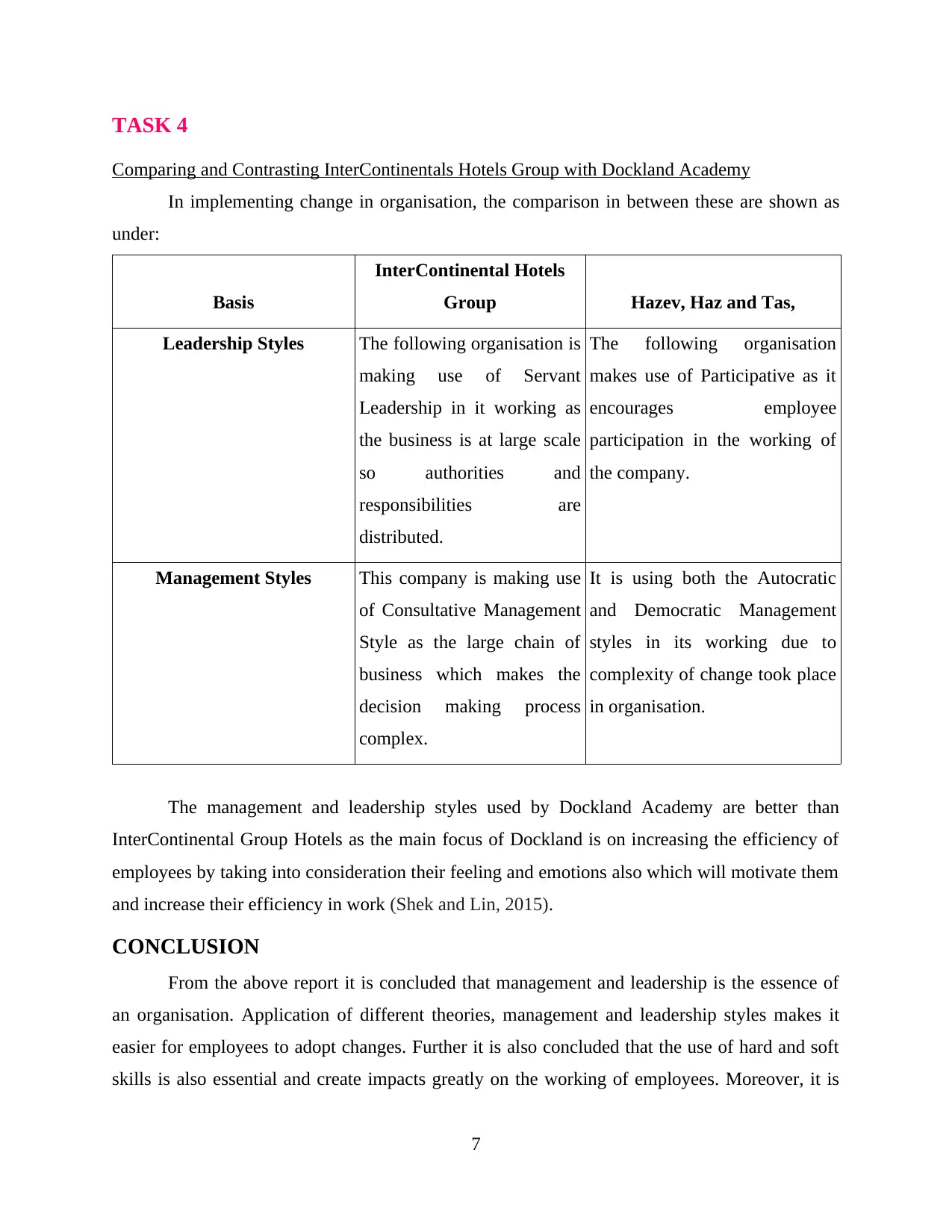
TASK 4
Comparing and Contrasting InterContinentals Hotels Group with Dockland Academy
In implementing change in organisation, the comparison in between these are shown as
under:
Basis
InterContinental Hotels
Group Hazev, Haz and Tas,
Leadership Styles The following organisation is
making use of Servant
Leadership in it working as
the business is at large scale
so authorities and
responsibilities are
distributed.
The following organisation
makes use of Participative as it
encourages employee
participation in the working of
the company.
Management Styles This company is making use
of Consultative Management
Style as the large chain of
business which makes the
decision making process
complex.
It is using both the Autocratic
and Democratic Management
styles in its working due to
complexity of change took place
in organisation.
The management and leadership styles used by Dockland Academy are better than
InterContinental Group Hotels as the main focus of Dockland is on increasing the efficiency of
employees by taking into consideration their feeling and emotions also which will motivate them
and increase their efficiency in work (Shek and Lin, 2015).
CONCLUSION
From the above report it is concluded that management and leadership is the essence of
an organisation. Application of different theories, management and leadership styles makes it
easier for employees to adopt changes. Further it is also concluded that the use of hard and soft
skills is also essential and create impacts greatly on the working of employees. Moreover, it is
7
Comparing and Contrasting InterContinentals Hotels Group with Dockland Academy
In implementing change in organisation, the comparison in between these are shown as
under:
Basis
InterContinental Hotels
Group Hazev, Haz and Tas,
Leadership Styles The following organisation is
making use of Servant
Leadership in it working as
the business is at large scale
so authorities and
responsibilities are
distributed.
The following organisation
makes use of Participative as it
encourages employee
participation in the working of
the company.
Management Styles This company is making use
of Consultative Management
Style as the large chain of
business which makes the
decision making process
complex.
It is using both the Autocratic
and Democratic Management
styles in its working due to
complexity of change took place
in organisation.
The management and leadership styles used by Dockland Academy are better than
InterContinental Group Hotels as the main focus of Dockland is on increasing the efficiency of
employees by taking into consideration their feeling and emotions also which will motivate them
and increase their efficiency in work (Shek and Lin, 2015).
CONCLUSION
From the above report it is concluded that management and leadership is the essence of
an organisation. Application of different theories, management and leadership styles makes it
easier for employees to adopt changes. Further it is also concluded that the use of hard and soft
skills is also essential and create impacts greatly on the working of employees. Moreover, it is
7
⊘ This is a preview!⊘
Do you want full access?
Subscribe today to unlock all pages.

Trusted by 1+ million students worldwide
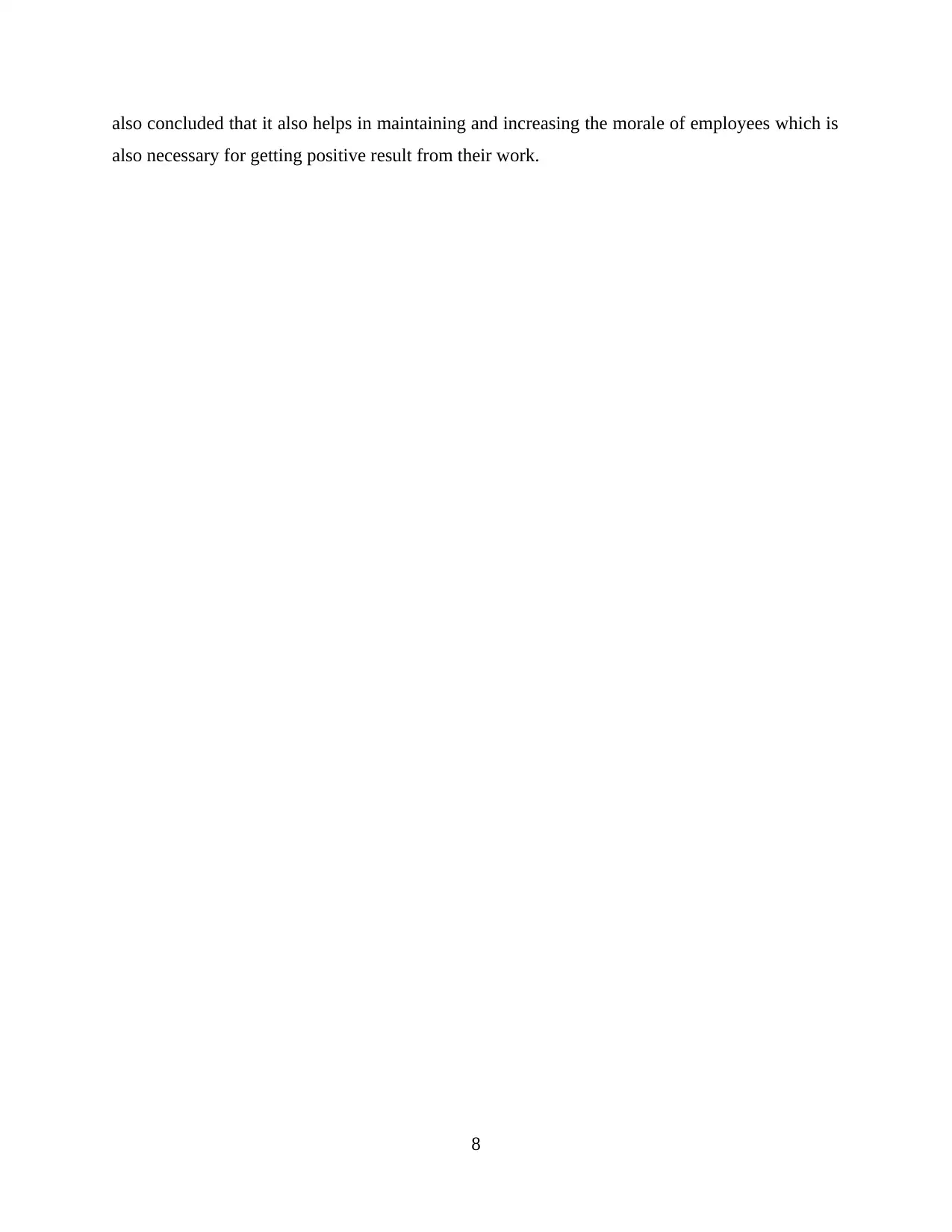
also concluded that it also helps in maintaining and increasing the morale of employees which is
also necessary for getting positive result from their work.
8
also necessary for getting positive result from their work.
8
1 out of 10
Related Documents
Your All-in-One AI-Powered Toolkit for Academic Success.
+13062052269
info@desklib.com
Available 24*7 on WhatsApp / Email
![[object Object]](/_next/static/media/star-bottom.7253800d.svg)
Unlock your academic potential
Copyright © 2020–2026 A2Z Services. All Rights Reserved. Developed and managed by ZUCOL.





